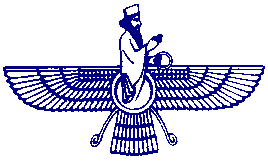 |
Zarathushtra Discussion Group[ Home | Contents | Search | Post | Reply | Next | Previous | Up ]
|
From: Dina G. McIntyre
Email: dinamci@aol.com
Date: 06 Jul 2000
Time: 18:27:33
Dear John,
Like Bahman, I cannot claim to have all the answers to your questions, but I will answer what I can.
First, you have to understand, that today no one knows for sure when Zarathushtra lived -- opinions range from 6,500 BC to 600 BC. In addition, Zoroastrian texts were burned, and their learned killed twice -- once when Alexander invaded Persia, around 500 BC and again when the Arabs did around 600 AD.
The Gathas are the only surviving work believed (by scholars) to have been composed by Zarathushtra. Later texts often say what Zarathushtra is supposed to have said, but they are all written in languages that are different from the language of the Gathas.
After Alexander, the surviving texts were collected into a collection called Yasna (which means "worship") and were recited as part of the rituals. The Gathas are embedded in the Yasna by priests (after 200AD) who were probably did not understand too well, the language in which they were written.
The Avesta is a collection of writings, written in the Avestan language (except for the Gathas, which are in an older language) many written centuries after Zarathushtra, and some of which is inconsistent with the message of the Gathas.
There was a priestly tribe in Media, originally not Zarathushtrian, but who later became Zoroastrianized and introduced into the religion much of the pre-Zarathushtrian beliefs (hence the inconsistencies of the later Avestan writings). It is not clear to me whether they adopted the name "magi" before or after they became Zoroastrianized. Gaumata was a Median (probably of the Magi) who rebelled against, and was defeated by, one of the Achaemenian kings. The Achaemenians were not of the Magi. The Sassanian kings (according to some historical writers) were of the Magi, hence the emphasis on rituals and prescriptions etc. during Sassanian times (very different from the original teachings).
The early Achemenians (Cyrus, Darius) are believed (by some scholars, like Prof. Insler of Yale) to have been Zoroastrian, because their inscriptions and practices were largely consistent with his teachings (e.g. tolerance, worship of truth, respect for human rights, etc.), and because Darius specifically mentions Ahura Mazda (Zarathushtra's name for God) in his inscriptions. But scholarly opinions differ. The practices of the later Achemenians were in many respects not consistent with Zarathushtra's teachings.
Let me know if you have any other questions. Wishing you the best,
Dina G. McIntyre.
![]()